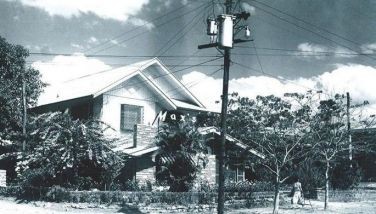Shining the hope eternal

Poverty is society’s quicksand. Even as impoverished Pinoys struggle to pull themselves out from this pit, the harsh realities of the situation simply swallow them back in. The truth jumps at our face: many are forced to get by within the clutches of this social quicksand.
Two major factors that account for this sad situation are lack of sufficient healthcare and education. Without access to clean water, proper nutrition or suitable sanitation, efforts to better their lots in life are undermined by maladies such as tuberculosis, cholera and malnutrition. And without the basic tools that education and livelihood training provide, it is practically impossible for them to orchestrate their paths to a better life.
Without access to the opportunities we often take for granted, their hopes for improvement remain in the realm of dreams. Given this state of affairs where mere survival is deemed a victory, a feeling of hope is always welcome.
One that provides hope is an organization called the International Care Ministries (ICM), an indigenous pro-active charity group that empowers the poorest communities in the country to more effectively serve their constituents via programs that meet the real-world needs of those mired in poverty.
This year, the ICM is celebrating some of its milestones and achievements from the last 15 years. And the figures are awe-inspiring and remarkable:
The ICM’s Medical Program has since operated more than 10,085 Open Air Medical Clinics, treating over 300,000 patients and distributing more than 9 million doses of medicine. Over 5,000 patients were referred to local medical doctors for additional treatments with 4,000 emergency medical procedures were paid for. Addressing the risk that tuberculosis poses to individuals and communities, the ICM treated 1,024 TB patients in its residential care program.
The group’s Feeding Program has reached more than 61,000 families, distributing over a million kilograms of rice – a welcome boon to both heart and stomach. Each six month period, the organization provides 25 of the neediest families in each partnering slum with weekly supplements of rice.
The ICM’s Counselor Program provided training for over 17,000 people in 363 major seminars. These seminars covered computer technology, integrated farming, pig-rearing and handicrafts. This is one effective way to empower people, by giving them the proper know-how and tools to survive.
In addition to its Counselor Program, the ICM will also be entering a strong partnership with the Center for Community Transformation (CCT), a Philippine non-profit organization that shares the ICM’s vision of uplifting the less fortunate. The two groups will pioneer a new microfinance program specifically tailored for the ultra-poor. On its own, CCT has been providing financial training and assistance to the poor in the Philippines through its financial training and micro-loan programs since 1992. And now, ICM and CCT will both be training the poor in the application of financial principles to help them develop strong livelihoods and a better hope for the future.
Initially, funding from the ICM came from Hongkong-based business people who had personally witnessed the condition in several depressed areas in the country. From a handful of volunteers, the organization drew more supporters who put in more pledges and donations. This year, however, with the financial crisis that has severely affected many of the companies (a number of them, multinational) with whom the volunteers are connected, ICM has had to come up with creative ways to fund its projects, aside from the usual donations from the Hongkong group. Local support will now have to come into play and this is where we can make a difference in helping the truly needy ones in our country. The appeal of this organization is that it is completely devoid of any political or religious agenda. That should be enough for us to make our personal commitment to help.
In my travels, I have seen the different struggles that the less fortunate undergo. But wherever it is that I am witness to such situations, I always see and feel the hope among the poor that a lifeline will come to help them. ICM is one.
For more information about the ICM, check out its website www.caremin.com.
* * *
Filipinos in London, and now we are, too, are up in arms and demanding that BBC apologize to the Filipino people for airing a nasty, anti-Filipina, racist skit in the “Harry and Paul” episode of September 26. Why, Marlon of Institute for Social Studies and Action Philippines describes the skit for us.
“A postman approaches comedian Harry Enfield, who is clearly agitated and shouting at someone, and asks him what’s going on. Harry then turns to comedian Paul Whitehouse, who is seated on a chair in his lawn, and beside him is a young girl wearing a grey uniform and an apron, gyrating and dancing lasciviously. Harry then tells the postman that he is shouting at his Filipino maid to do her job and get his friend Paul to mate with her. He keeps ordering the girl to gyrate and dance in front of Paul and even instructs her to ‘hump; him.’ When an indifferent Paul stands up to go inside the house, Harry scolds the girl, telling her to get out and just go. The scene closes with the postman sidling up to the Filipina, whispering something in her ear as they walk off together.”
Marlon writes: “The skit is base because of the negative stereotypes it promotes. Comedy shows like ‘Harry and Paul’ furthers the vulnerability of communities and populations to racism and social stereotyping. Mainstream media has the power to embed these notions into popular consciousness, making it easy for the public to see Filipino women as submissive sexual objects. ‘Harry and Paul’ is actually cultivating the sense of impunity enjoyed by old white men who take advantage of poverty-driven labor migration to women they can abuse.
“I happen to like British humor. I like Little Britain for its irreverence, and I am a fan of Hugh Grant. This show, however, isn’t funny. I agree that BBC owes the Filipino people an apology.”
My email: dominimt2000@yahoo.com
- Latest
- Trending























